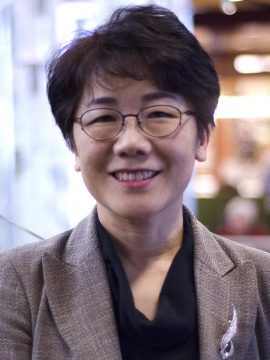Mi-Young Kim
Research / Teaching Area
About
Mi-Young Kim earned her Ph.D. in Language and Literacy Education at UBC and M.A. in Teaching English as a Second Language (TESL) from the University of Illinois at Urbana-Champaign. Her dissertation topic as well as her main research focus is on academic socialization of second language learners, particularly those who studied English as a foreign language and are from a different academic culture. Her other research and teaching interests include sociolinguistics, especially on the topic of identity and ideology of language learners, academic writing, translation, TESL, English for Academic Purposes (EAP), among many others.
Teaching
Additional Description
“Friction and the Role of the Media”
The world is full of friction (conflicts); some argue it is the constructive force that prompts ideas and innovation while others warn that it is a destructive force producing fear and conflict. Media, particularly social media which has been an indispensable part of people’s lives, reflects or generates friction in our society and is often criticized for being a brewing ground for misinformation, disinformation, and malinformation.
This section of WRDS150B will introduce a selection of unabridged, peer-reviewed scholarly articles and discussions on “friction” with the subtopics such as inclusive societies, gun control, vaccination, neoliberalism, GMO food, climate change, and ChatGPT/AI/robots. We will observe how scholars from various disciplines such as environmental sciences, natural sciences, media studies, business, and political science construct knowledge on these topics: e.g., what questions they ask and how they phrase their inquiry as well as why they choose to use a certain methodology for their inquiry and how it may affect the way their inquiry is answered. Along with exploring various research genres and methods, types of data, and writing practices, we will investigate how different types of knowledge are produced and friction aggravated by media can generate.
We will also become familiar with the conventions of academic writing and the basic premise of research through the individual and collaborative writing assignments and activities, as well as participate in scholarly conversations through our own research on the topic of friction and the role of media.
